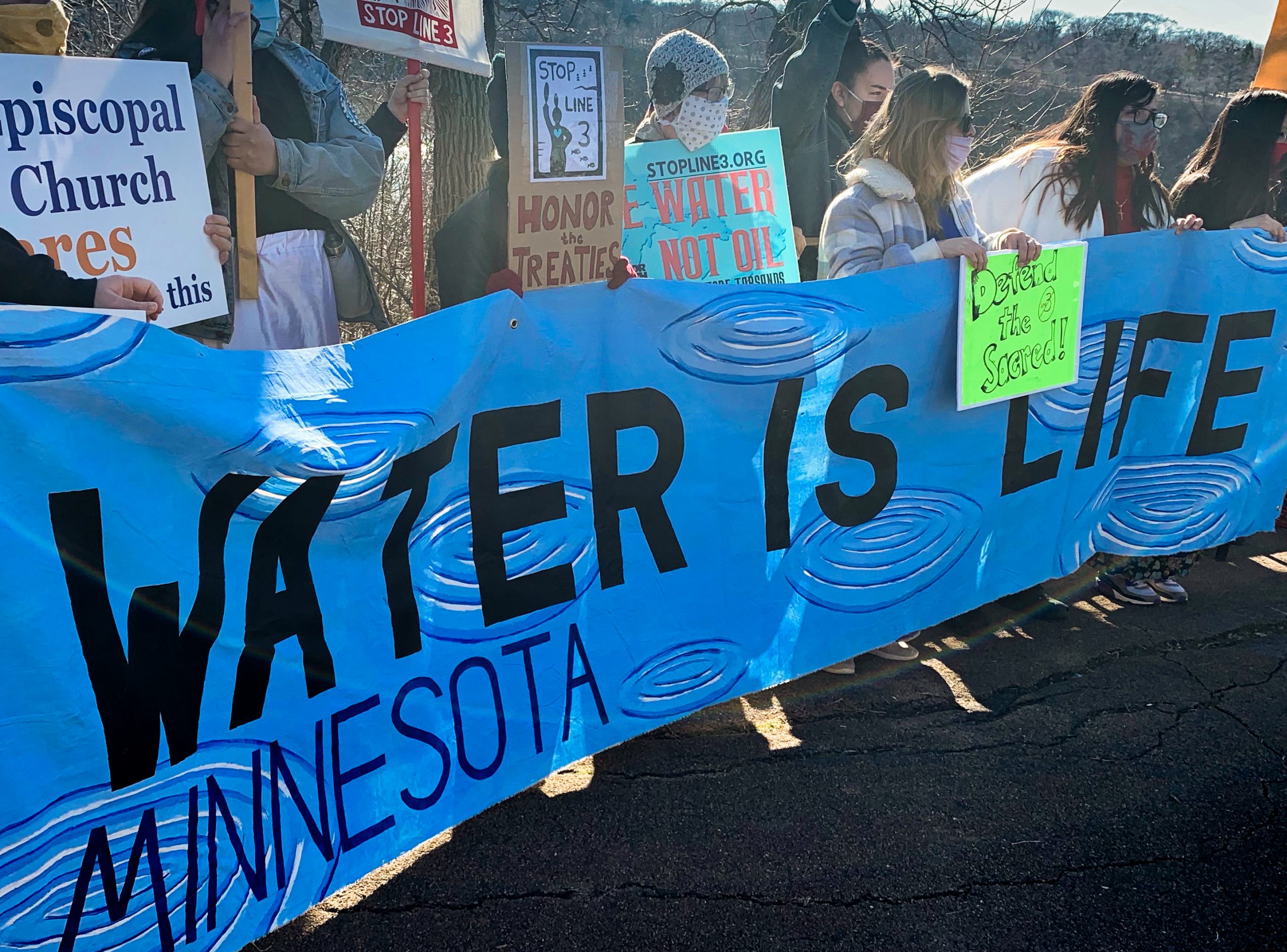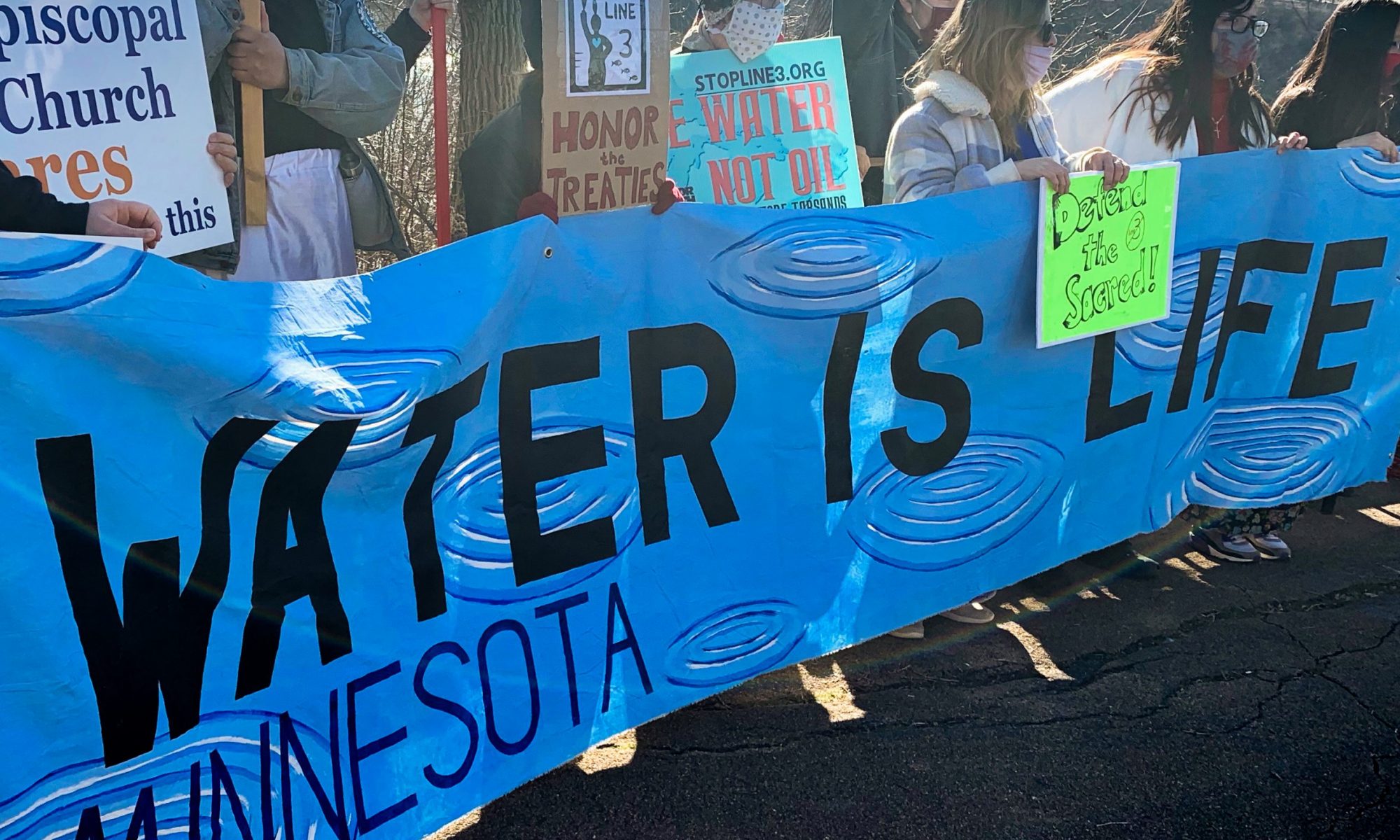
Opponents of the Enbridge Replacement Line 3 pipeline, which will cover 300 miles of northern Minnesota land, gathered for a march and rally March 11 in St. Paul near the Mississippi River where they called on President Joe Biden to halt construction on the controversial project.
The hosting group, Minnesota Interfaith Power and Light, called on the Biden administration to protect Mississippi River water, Native American treaty rights and the environment by putting a stop to Replacement Line 3.
“The Mississippi that’s being drilled into is the same Mississippi that flows all the way down to the Gulf, so this affects countless communities. And, as always, climate destruction disproportionately affects people and communities of color,” MNIPL’s Terri Burnor said.
Replacement Line 3 will transport tar sands oil through the headwaters region of the Mississippi River and across 330 miles of northern Minnesota land.
Running from Canada to Wisconsin, the pipeline will cut through treaty protected lands of several Ojibwe tribes, including the Fond du Lac reservation, and it will cross under the Mississippi River twice along the way.
The new Enbridge pipeline is already undergoing construction and will replace an old Line 3 that already runs through Minnesota. Built in the 1960s, the original Line 3 has structural damage and a limited operational capacity.
According to Enbridge’s website, the company’s “private investment—$2.6 billion of it in Minnesota—will create well-paying jobs, an economic boost for local communities during construction, and local community investments and tax contributions for many years.”
Critics are concerned because 30 years ago in Grand Rapids, Minnesota, Enbridge oil recorded the biggest inland oil spill in United States’ history. That spill happened during the winter, so the oil spilled on ice rather than into the water, but the event could have been devastating if water had been flowing at the time.
“St. Thomas and the Twin Cities are right along the beautiful Mississippi, so if the pipeline leaks, and it will leak because pipelines always leak, it will affect us down the road,” Johannah Frisby, Outreach Coordinator at MNIPL, said.
The State of Minnesota released an Environmental Impact Statement for Line 3 which states that the project will have “disproportionate and adverse impacts” on Native people, and says that “any of the routes, route segments, and system alternatives would have a long-term detrimental effect on tribal members as a result of crossing treaty lands.”
“This crosses through the Fond du Lac nation and threatens the treaty rights that give our indigenous community in Minnesota the ability to enjoy and use their land,” Frisby said. Drilling a pipeline through that land is seen by many as a violation of past treaties made with Native people.
Objectors to Line 3 also cite environmental issues with the project. Frisby said that the project’s carbon emissions will “equal that of 50 coal power plants being built in Minnesota.”
The project will establish fossil fuel infrastructure that will operate for decades. “As we in Minnesota are trying to reduce our ecological footprint, this is just the opposite direction that we need to go,” Frisby said.
Critics also argue that even with its economic benefits, the construction of a new oil pipeline is unnecessary both locally and nationally. The national oil industry’s need for a new line is minimal, they say, and an oil market analysis conducted by the State of Minnesota found Replacement Line 3 nonessential.
The Minnesota Department of Commerce found that “Enbridge has not established a need for the proposed project; the pipeline would primarily benefit areas outside Minnesota; and serious environmental and socioeconomic risks and effects outweigh limited benefits.”
Despite the number of concerns over Replacement Line 3, the project is over 30% complete.
“We focus our attention on Biden because that’s now where the permits mostly lie… We’ve been calling on Walz for years, but quite frankly he has let down on his promise — he ran on a campaign to reduce Minnesota’s environmental impacts and this is just the opposite,” Frisby said.
MNIPL and other groups have planned future events that, like the march and rally in St. Paul, will be aimed at lifting a unified voice in objection to Replacement Line 3. For those in the Twin Cities, there is also a weekly gathering at the Stone Arch Bridge every Saturday from 2-3PM to raise awareness for these issues.
“For those wanting to get involved in nonviolent direct action, there are lots of opportunities to head up North to the pipeline, either as ground support or if one is interested in doing arrestable action,” Burnor said.
There are ways to get involved at home as well, Burnor said, including contacting the White House or local elected officials, donating to organizations, and moving personal funds out of the banks that are financially supporting the project.
“This pipeline might not affect you immediately, but it will affect you eventually from water, to clean air and how you interact with and enjoy the land,” Frisby said.
Lauren Price can be reached at lauren.price@stthomas.edu.


Very informative and engaging, caused an anger inside me about the detrimental effects to the environment.
Very sad that Native American rights and their lands continue to be violated and destroyed without consent! This will just contribute to the setbacks they face every day…
Stop line 3! Our environment is so precious and this company has no regard for it. There other lines have leaked but they don’t fix them. Check out Michigan. One of their representatives stated in a meeting that they check for leaks by flying over the lines. By the time they discover a leak it has destroyed acres of land and our water. STOP line 3. This oil isn’t even for the US.